Plumpness is usually a sign of gluttony. Many folks want to lose weight but struggle with persistent hunger. You probably have a friend (or two) who refer to their belly as a bottomless pit.
You must enter a calorie deficit to shed the spare tire. A calorie deficit involves burning more calories in a day than you consume. There are two ways of achieving a calorie deficit. You could eat less or burn more calories by increasing your physical output.
Working out to lose weight is easier said than done. You need a balanced training program designed by a professional to see results, a luxury few can afford. The former, however, can be done by anyone without overextending themselves.
Present a non-training overweight individual these two choices, and he’ll probably pick eating less over slogging it in the gym.
In this article, we present 16 ways to shed excess fat and achieve your dream physique. Don’t worry. We won’t ask you to follow a fad diet, starve yourself, or go on a water-only diet. These tips promote overall health and well-being and will improve your longevity.
-
16 Ways To Eat Less and Meet Your Weight Loss Goals
- 1. Eat Smaller Meals Throughout The Day
- 2. Load Up on Veggies
- 3. Switch to Smaller Plates and Spoons
- 4. Start a Love Affair With Protein
- 5. Drink a Lot of Water
- 6. Cut Out Liquid Calories
- 7. Chew Your Food 32 Times
- 8. Eliminate Condiments
- 9. Say No To Buffets
- 10. Try Intermittent Fasting
- 11. Sleep Well
- 12. Plan Your Meals
- 13. Make Vegetable Soup or Salad a Part of Your Meals
- 14. Spice Up Your Food
- 15. Start an Intense Training Regimen
- 16. Track Your Calories
- Wrapping Up
- References
16 Ways To Eat Less and Meet Your Weight Loss Goals
It doesn’t matter how hard you work out; you can never out-train a bad diet. Internalizing these tips will help you trim the excess fat and watch the needle budge in the right direction:
1. Eat Smaller Meals Throughout The Day
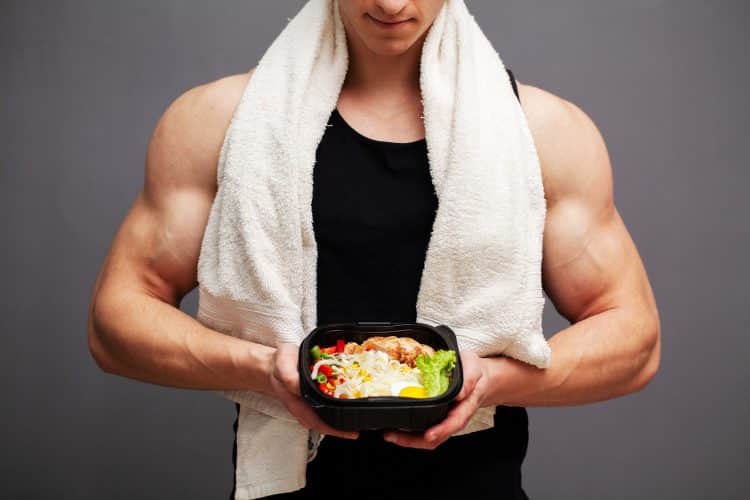
Instead of eating three big meals, you should eat smaller frequent meals throughout the day. Eating frequent small meals helps you feel satiated. Plus, there is little chance of snacking on junk food between meals if you eat nutrition-dense whole foods after every two to three hours.
Notably, many people think that eating frequently can help boost their metabolism. Studies, however, have shown that eating at small intervals does little to nothing for your metabolic rate. On the flip side, some studies suggest that eating fewer, larger meals are more effective at increasing the thermic effect of food (TEF) than eating frequent meals. [1][2]
You must, however, ensure that you’re not entering a calorie surplus or staying on your maintenance calories while eating more frequently. Think of your meals as snacks if that helps you eat less.
2. Load Up on Veggies
Vegetables contain a lot of water and fiber, making you feel full for longer. At the same time, vegetables contain a limited number of calories, which is a win-win. Prioritize non-starchy vegetables over their starchy counterparts.
Non-starchy vegetables include broccoli, tomatoes, zucchini, asparagus, Brussels sprouts, celery, cabbage, and red peppers.
Corn, white potatoes, sweet potatoes, green peas, beets, acorn squash, butternut squash, turnips, and carrots are examples of starchy vegetables.
You should adjust your vegetable intake depending on your weight loss goals. Allocate half of your plate to vegetables if you want to lose more than one pound of body weight weekly. [3]
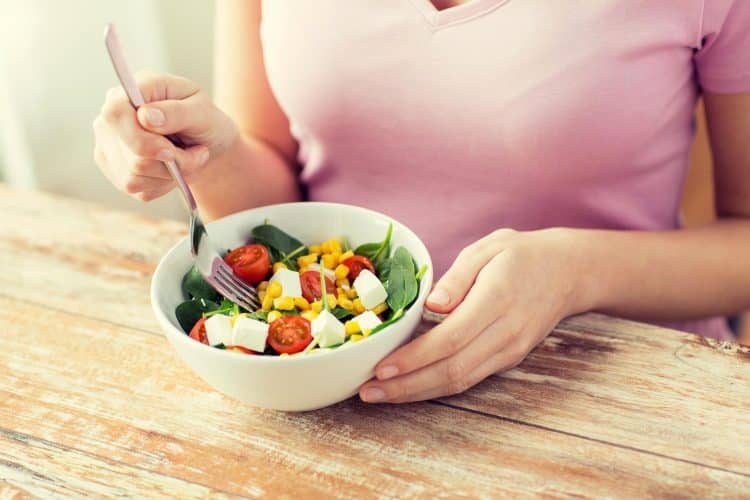
3. Switch to Smaller Plates and Spoons
Since we’re talking about plates, let’s address a critical contributor behind your spare tire — your plate size.
You’re more prone to overeat if you eat on king-sized plates. Switch to smaller plates, bowls, and cups to lose weight. Filling your small utensils with food will trick your brain into thinking you’ve consumed your fair share of food, even though it will be 20-30% less than what you ate on your bigger utensils. [4]
Using smaller forks and spoons is an underrated way of eating less. You’ll relate to this if you have tried eating your cereal with a teaspoon. If you haven’t, you should start.
4. Start a Love Affair With Protein
Most people know protein as a muscle-building macronutrient. It is, however, much more than that. Protein can be your best friend on a weight loss diet as it can make you feel fuller for longer, helping you stay away from binge eating or feasting on junk food.
Eating less isn’t limited to cutting out a meal and a few snacks from your diet. You must follow a balanced and calculated approach. Begin by calculating your daily caloric goal and break it into suitable macronutrient targets. You must have a balanced dose of carbs, protein, fats, and micronutrients in each meal to avoid deficiencies.
Prioritize protein in each meal while keeping your holistic diet goal in mind. Eating a healthy chunk of protein with each meal will keep you satiated until your next meal and will promote muscle tissue development.
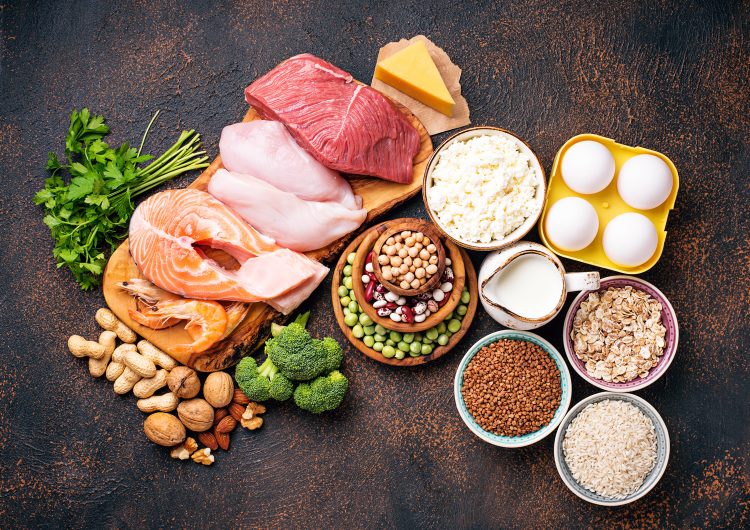
5. Drink a Lot of Water
Most weight loss regimens overlook the role of water. Drinking water right before a meal reduces your chances of overeating. And since it is calorie-free, it doesn’t add to your weight loss bottom line.
Water is also more effective than any other beverage in keeping you hydrated. Furthermore, it helps carry nutrients and oxygen to your cells, enhances cognitive function, improves digestion, prevents constipation, normalizes blood pressure, boosts joint health, and regulates body temperature.
Drink at least a gallon of water daily to avoid dehydration and reduce your chances of overeating. You could add a lemon to your water if you dread drinking the tasteless liquid throughout the day.
You can drink black coffee, black tea, or green tea if you feel lousy or lethargic while cutting your calories. Feel free to add creamers, milk, or sugar to your caffeinated beverages. However, make sure you’re not overshooting your daily calorie target.
6. Cut Out Liquid Calories
Liquid calories are the bane of most weight loss diets. Sugar-laden beverages like colas, juices, and smoothies are delicious but wreak havoc on your daily calorie goals and leave you hungry for more. It is a trifecta you must avoid.
Even worse are the empty calories you get from alcohol. You’ll eat less than usual on a weight loss program. Hence, you must ensure you get the best bang for your buck with every calorie you put in your body.
If you’re not big on eating whole foods in each meal and prefer consuming a beverage in some of your meals, you must ensure you get your calories from nutritious sources like milk or plant-based milk alternatives.
Furthermore, a protein shake should be your go-to if you must have a delicious beverage in your diet program.
7. Chew Your Food 32 Times
Many people tend to overeat because they eat too quickly. Expert recommends chewing each bite of your food an estimated 32 times before swallowing. Furthermore, foods that are harder to chew, such as steak and nuts, may need up to 40 chews. It helps water down the food, which makes it easier to digest.
Tracking your chew count will slow down your eating, and it can reduce your overall food intake. Not chewing your food enough can lead to digestive issues like bloating, diarrhea, heartburn, acid reflux, nausea, headaches, indigestion, and gas. [5]
8. Eliminate Condiments
Condiments can be the culprit behind your bulging waistline. Sauces and flavoring make your meals delicious, and most of us tend to go overboard with them. Healthy food is usually bland. Chicken breast, broccoli, and rice are healthy but lack flavor. Adding sauces, mayonnaise, and ketchup changes all this.
You should begin by switching to low-calorie condiment alternatives and work toward cutting them out completely. This brings us to grocery shopping. Everything in your cupboard will eventually end up in your belly. We recommend staying away from snacks and sugary foods on your grocery runs. Always enter the grocery store with a plan and avoid mindless aisle browsing. It will save you from making unhealthy decisions that you’ll regret after the junk food is in your belly.
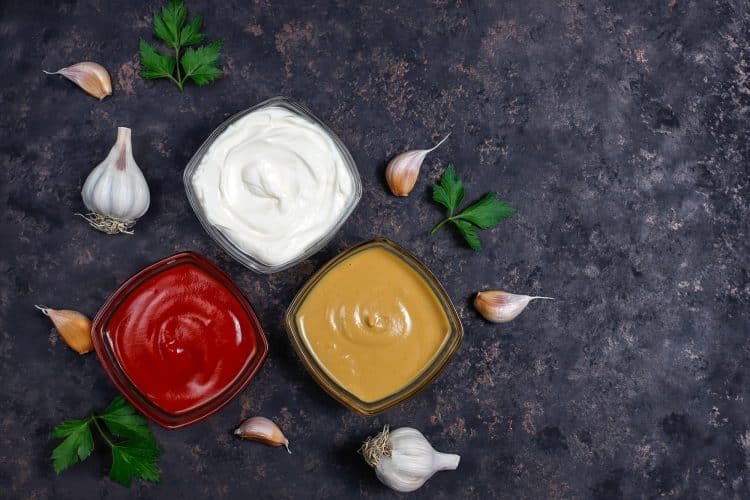
9. Say No To Buffets
Let’s be honest. We’ve all been to buffets and eaten more than we should have. We’ve done this multiple times, even after promising ourselves we won’t repeat this mistake. The worst part? The food isn’t even that good.
There is something about looking at people around you eating like it’s the Last Supper that makes you want to hog on everything you can lay your eyes on. And then there is the little voice at the back of your head telling you to eat more than your money’s worth.
Avoid going to buffets if you cannot leave the restaurant without tasting everything on the menu. Also, engage in mindful eating during family dinners or eating out with your friends. Your colon will thank you for it.
10. Try Intermittent Fasting
Intermittent fasting is one of the most effective dieting protocols for losing weight and improving overall health. It involves alternating between fasting and eating windows over a given period. Alternate-day fasting, periodic fasting, and daily time-restricted feeding are some popular IF methods.
The 16/8 protocol is the most popular IF schedule. It involves eating in an eight-hour window and fasting for the remaining 16 hours of the day. Since the feeding window is restricted to eight hours, most people automatically enter into a caloric deficit as they skip a meal or a snack. You could also try the 18/6 intermittent fasting schedule if you want a more stringent protocol.
Although an intermittent fasting diet doesn’t restrict your dietary choices, you must limit yourself to nutrient-dense whole foods for the best results.
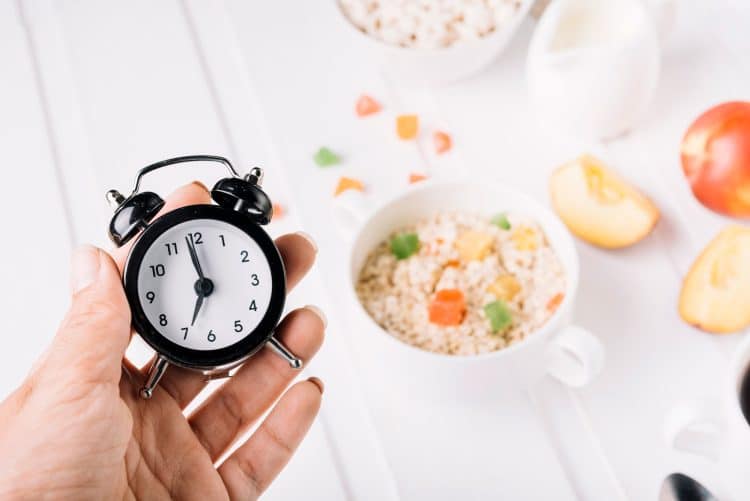
11. Sleep Well
It’s no coincidence that we have intermittent fasting and sleeping together. Unless you’re a zombie, you don’t eat while asleep.
Folks that only sleep for 4-6 hours a day tend to overeat because they are awake longer. Notably, most binge eating happens late at night or early morning. Sleeping for the recommended eight hours will limit your chances of snacking on junk food, as it resets your hormone levels and appetite.
Furthermore, studies suggest that sleep depreciation can lead to increased hunger. You can rest assured that you won’t make intelligent dietary choices if you wake up hungry. [6]
12. Plan Your Meals
Failing to plan (and prep) your meals makes falling off your diet plan easier. You should prepare a week’s worth of meals on Sunday. Having your meals waiting for you in the refrigerator dismisses the chances of ordering pizza for lunch or tacos for dinner.
Planning your meals also ensures that your meals are macro-balanced. Eating the right amount of protein, carbs, and fats in each meal goes a long way in helping you achieve your goal weight. It will also help you control your portion sizes.
13. Make Vegetable Soup or Salad a Part of Your Meals
Drinking soup before a meal helps suppress your appetite. You should, especially, have soup before your meal when you are starving or go out to eat with your friends and family. According to a study, people tend to eat 20% fewer calories if they start their meals with vegetable soup. [7]
Similarly, eating a salad during your meal will help fill you up faster because of its high fiber content.
Eating more before or during your weight loss-focused meal might sound counterintuitive, but it works.
14. Spice Up Your Food
Adding hot pepper to your food can help lower your appetite. It is because of a compound in hot peppers called capsaicin. And no, we aren’t talking about a pinch of hot pepper; we’re talking about a spoonful that makes you sweat.
However, ensure you’re not overdoing the hot pepper, as it can cause digestive issues. The idea is to spice up your meals enough to make you think twice before each bite. Alternatively, you could drink ginger tea before a meal, as it is a potent diet suppressant.
15. Start an Intense Training Regimen
Working out can help achieve a calorie deficit. You burn calories during your workouts. It also spikes your metabolic rate, enabling you to burn calories even when you are not physically active.
Besides this, an intense training regimen makes you more invested in your weight loss program. You are less likely to eat a high-carb white sauce pasta when you know you’ll have to offset it by running 30 minutes on the treadmill.

16. Track Your Calories
One of the best ways to eat less is to start tracking your calories. Having a rough estimate of your daily calorie intake is one thing, but knowing how many calories you put in your body in real time is a different ball game altogether.
Every time you log a high-calorie meal in your calorie tracking app, it will make your stomach drop. The chances of feasting on junk food are significantly lower when you are tracking your calories.
Using a calorie tracking app will also train you to look at a food’s nutritional information before adding it to your meal. This habit will pay dividends in the long run.
Wrapping Up
During your weight loss journey, you must ensure that you don’t develop an unhealthy relationship with food. You might achieve your weight loss goal by mindlessly cutting out food, but your success will likely be short-lived. Your weight will catapult back as soon as you start reverting to your old eating habits.
Remember, entering a calorie deficit is the key to weight loss. You must not switch to a sedentary lifestyle to compensate for the calorie shortfall. These 16 tips will help you eat less without developing abnormal behaviors such as skipping meals, binge eating, and restricting certain foods. Best of luck!
References
- Ohkawara K, Cornier MA, Kohrt WM, Melanson EL. Effects of increased meal frequency on fat oxidation and perceived hunger. Obesity (Silver Spring). 2013 Feb;21(2):336-43. doi: 10.1002/oby.20032. PMID: 23404961; PMCID: PMC4391809.
- Manuel Calcagno, Hana Kahleova, Jihad Alwarith, Nora N. Burgess, Rosendo A. Flores, Melissa L. Busta & Neal D. Barnard (2019) The Thermic Effect of Food: A Review, Journal of the American College of Nutrition, 38:6, 547-551, DOI: 10.1080/07315724.2018.1552544
- Rolls BJ, Ello-Martin JA, Tohill BC. What can intervention studies tell us about the relationship between fruit and vegetable consumption and weight management? Nutr Rev. 2004 Jan;62(1):1-17. doi: 10.1111/j.1753-4887.2004.tb00001.x. PMID: 14995052.
- Vartanian LR, Reily NM, Spanos S, Herman CP, Polivy J. Self-reported overeating and attributions for food intake. Psychol Health. 2017 Apr;32(4):483-492. doi: 10.1080/08870446.2017.1283040. Epub 2017 Jan 30. PMID: 28135848.
- Andrade AM, Greene GW, Melanson KJ. Eating slowly led to decreases in energy intake within meals in healthy women. J Am Diet Assoc. 2008 Jul;108(7):1186-91. doi: 10.1016/j.jada.2008.04.026. PMID: 18589027.
- Schmid SM, Hallschmid M, Jauch-Chara K, Born J, Schultes B. A single night of sleep deprivation increases ghrelin levels and feelings of hunger in normal-weight healthy men. J Sleep Res. 2008 Sep;17(3):331-4. doi: 10.1111/j.1365-2869.2008.00662.x. Epub 2008 Jun 28. PMID: 18564298.
- Flood JE, Rolls BJ. Soup preloads in a variety of forms reduce meal energy intake. Appetite. 2007 Nov;49(3):626-34. doi: 10.1016/j.appet.2007.04.002. Epub 2007 Apr 14. PMID: 17574705; PMCID: PMC2128765.


